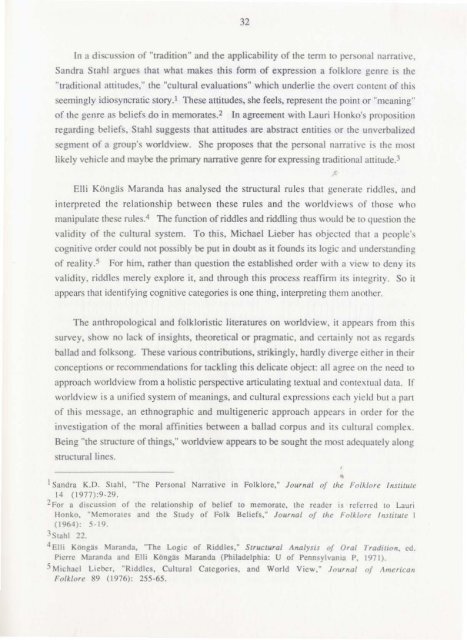Untitled - Memorial University's Digital Archives - Memorial ...
Untitled - Memorial University's Digital Archives - Memorial ...
Untitled - Memorial University's Digital Archives - Memorial ...
Create successful ePaper yourself
Turn your PDF publications into a flip-book with our unique Google optimized e-Paper software.
32<br />
In a discussion of "tradition" and the applicability of the tenn lO personal narrative,<br />
Sandra Stahl argues that what makes this fonn of expression a folklore genre is the<br />
"traditional attillldes," the "cultural evaluations" which underlie the over! content of this<br />
seemingly idiosyncratic story.l These attitudes, she feels, represent the poilll or "meaning"<br />
of the genre as beliefs do in memorates.2 In agreement with Lauri Honko's proposition<br />
regarding beliefs. Stahl suggests that attitudes are abstract entities or the unverbalized<br />
segment of a group's worJdview. She proposes that the personal narrative is the mOSI<br />
likely vehicle and maybe the primary narrative genre for expressing traditional attitude.3<br />
Elli K6ngiis Maranda has analysed the structural rules (hat generate riddles, and<br />
interpreted the relationship between these rules and the world views of those who<br />
manipulate these rules. 4 The function of riddles and riddling thus would be to question the<br />
validity of the cultural system. To this, Michael Lieber has objected that a people's<br />
cognitive order could not possibly be put in doubt as it founds its logic and understanding<br />
of reality.S For him, rather than question the established order with a view to deny its<br />
validity, riddles merely explore it, and through this process reaffirm its integrity. So it<br />
appears that identifying cognitive categories is one thing, interpreting them another.<br />
The anthropOlogical and folkloristic literatures on worldview, it appears from this<br />
survey, show no lack of insights, theoretical or pragmatic, and cenainly not as regards<br />
ballad and folksong. These various comributions, strikingly, hardly diverge either in their<br />
conceptions or recommendations for tackling this delicate object: all agree on the need to<br />
approach worldview from a holistic perspective articulating textual ,md contextual data. If<br />
world view is a unified system of meanings, and cultural expressions each yield but a pan<br />
of this message, an ethnographic and multigeneric approach appears in order for the<br />
investigation of the moral affinities between a ballad corpus and its cultural complex.<br />
Being "the stmcture of things," worldview appears to be soughtlhe most adequately along<br />
slnJcturallines.<br />
1Sandra K.D. Stahl, "The Personal Narrative in Folklore," Journal 01 the Folklore In.Hi/u/e<br />
14 (1977),9-29.<br />
2For a discussion of the relationship of belief to memorate, the reader is referred to Lauri<br />
Honko, ftMemorates and the Study of Folk Beliefs,ft Journal of lire Folklore InJ/i/Ule I<br />
(t964): 5-19.<br />
3Stahl 22.<br />
4 Elli K6ngas Maranda, 'he Logic of Riddlcs," Structural AnalyslJ 01 Oral Tradilion, ed.<br />
Pierre Maranda and Elli KOnglls Maranda (Philadelphia: U of Pennsylvania p. 1971).<br />
5 Michael Lieber. "Riddles, Cullural Catcgories, and World View," Journal 01 American<br />
Folklore 89 (1976): 255-65.<br />
.

















